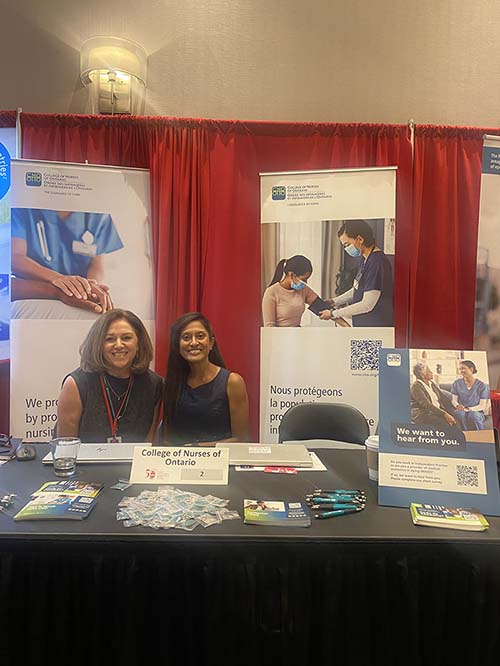CNO presented at the Nurse Practitioners’ Association of Ontario (NPAO) Annual Conference in Toronto from Sept. 20–22, where attendees had the opportunity to celebrate 50 years of the NPAO.
The largest nurse practitioner (NP) conference of its kind in Canada, the event brought together NPs, employers, exhibitors, health care partners and more to share knowledge, network and celebrate the profession.
“This is a fantastic opportunity to showcase CNO expertise with NPs from across Ontario”, said Catriona Mill, CNO’s Manager of Practice Quality. She presented alongside Advanced Practice Consultant Chantal Rioux at the event, sharing insights about CNO’s regulatory role and its modernization, legislation and regulation changes and NP practice updates.

Cathy Tersigni and Sarah Alley, CNO Advanced Practice Consultants, at NPAO Conference
CNO had a booth at the event, where we connected with nurses who had questions about their practice and CNO initiatives, such as Quality Assurance, the new Scope of Practice standard, Code of Conduct and more.
“It's inspiring to see so many nurse practitioners gathered together and engaged with their accountabilities to support client safety,” said Mill.
The conference featured an awards celebration, exhibits, educational opportunities, plenary sessions and sponsored symposia. In addition, at the booth, CNO had a call out to nurses working in independent practice or with medical assistance in dying (MAID) who are interested in participating in a focus group about revisions to guidelines related to their practice. If you are interested in providing subject matter expertise in either of these areas, please fill out this survey.
It was a parallel anniversary celebration of sorts for NPAO and CNO. While NPAO is celebrating 50 years since its founding in 1973, this year marks 60 years for CNO.
The organizations have collaborated over that time to pursue shared success in supporting patient safety. In 1997 CNO became the first Canadian regulator to regulate NPs. It continues to follow the single regulator model where all Ontario nurses can look to one organization for their standards and accountabilities.
“It was a great opportunity to connect and collaborate with NPs, and we look forward to continuing to build on our shared success in the future,” added Mill.